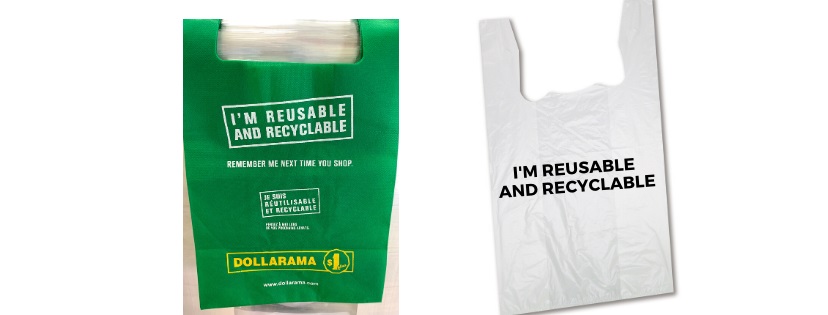Are Plastic Bags Recyclable?
Are plastic bags recyclable? Did you know that plastic is reusable and recyclable? When plastic bags and overwrap is recycled, these materials can be used in the construction of useful items such as park benches and plastic flowerpots. Many misconceptions surround plastic bag use such as the damage it causes the environment as a whole, and in this article, we seek to explain how such damage can be mitigated and how we can find environmental-friendly options to recycle and reuse our plastic.
The Canadian Plastics Industry Association (CPIA) states that most Canadians use large or small plastic film daily and in many ways. Plastic bags are mainly used to hold our shopping purchases. Large plastic film such as stretch wrap is used to protect skids of merchandise to prevent damage during transit. Stretch wrap is also used to protect boats during the winter. Plastic film and overwrap prevent food from spoiling and maintain hygiene in fresh foods. This reduces the amount of food sent to landfills. Undoubtedly, plastic film provides a valuable service to us in our everyday lives.

Are Plastic Bags Recyclable and Can This Eliminate
Environmental Damage?
How can we do our part to prevent environmental damage? Most cities have already started charging a fee for plastic bags, which has successfully prevented too many bags from accumulating in storm drains or oceans. Perhaps imposing a fine for even disposing plastic film in these places is in order. But in general, the best option is to reuse plastic film products and packages for as long as possible.
So, are plastic bags recyclable? Did you know that LDPE (low density polyethylene) bags are reusable? They are nicknamed Bags-for-Life, as they are thickly gauged, heavy duty plastic bags. These are highly reusable, convenient, and can be used as kitchen catchers. LDPE also has a high reuse rate, is made in Canada, and can be recycled in Canada. When plastic film products can no longer be used safely or hygienically, the next best option is to recycle them.
The CPIA has a Film Drop-off Directory which can be used find out where and how plastic bags and overwrap can be recycled. The CPIA supports efforts to divert used plastic bags from landfills and educates consumers on how they can reduce, reuse, and recycle plastic bags. The CPIA works with municipalities to expand curbside recycling of plastic overwrap and plastic bags. In addition, the CPIA has funded studies and worked with communities and industry partners to find out the best methods of recycling large amounts of plastic film.
At some retailers, plastic bags have already been replaced with paper bags. Because paper is degradable, people often believe it to be a more environmentally friendly option than plastic. But paper bags were not found to be better for the environment when it comes to climate change. Paper bags have a higher carbon footprint than plastic bags. The reason for this is because paper bags are thicker than plastic bags.
“Very broadly,” says David Tyler, Professor of Chemistry at the University of Oregon, “carbon footprints are proportional to the mass of an object.” We see the larger carbon footprint of paper bags because they take up greater space in transportation and more trucks are required to transport them than the trucks required to ship plastic bags.
Another alternative to paper bags is reusable bags made of cotton. These are not be good for the environment either. As the World Wildlife Fund, an Australian study, noted, cotton bags have major impacts on the environment. Only 2.4 percent of the world’s cropland contains planted cotton, yet this accounts for 24 percent of the global market for insecticides and 11 percent of the global market for pesticides. A pound of cotton requires more than 5000 gallons of water on average, which is a greater thirst than that of any vegetable. And in most places, cotton is also not recyclable.
So, what would be the answer? Eric Goldstein, environment director for the Natural Resource Defense Council for New York City, says, “There’s no easy answer. There are so many variables. Here’s just one tiny example: Does the paper for paper bags come from a recycled paper mill on Staten Island or a virgin forest in northern Canada? …Also, this question is something like asking, ‘Would you prefer to get a parking ticket or a tax assessment?’ It depends on the specifics, but it’s better to avoid both wherever possible.”
Danshar Polybag and Resin is committed to finding ways to reuse and recycle our plastic film products as much as possible. Together, we can make a positive impact on our environment.Though plastic film may contribute to emissions, cars are essentially doing the same. We have yet to hear of any individual or organization pushing to find ways to do away with cars or brainstorming alternatives to transportation. Horse and buggy, anyone?
2899 Steeles Ave. W.,
Units 9 & 10,
North York, Ontario
M3J 3A1
Fax: 1-855-669-6184
For skid quantities of stretch wrap, resin, or plastic bags only, please call
416-993-6804
orderdesk@torontostretchwrap.com
By appointment.